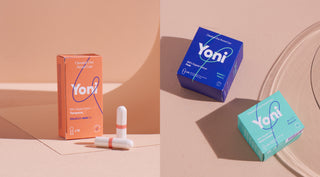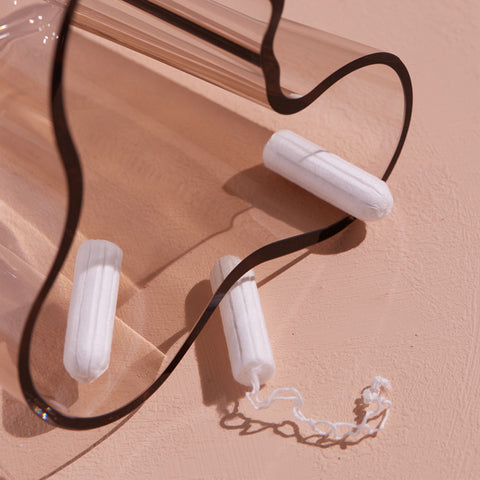
- Your inspiration behind starting Yoni?
- Where does the name Yoni come from?
- What makes Yoni period products unique?
- Why and how are Yoni products 'chemical free'?
- What's the biggest misconception of menstruation?
- An open conversation surrounding menstruation
- Tell us about your #payforaperiod campaign
Discover the period care range, known for its chemical free, organic products. This week, we spoke with Mariah Mansvelt Beck, the Co-Founder of Yoni to find out the origins of the brand and her visions of promoting a more open conversation about menstruation.
What was your inspiration behind starting Yoni?
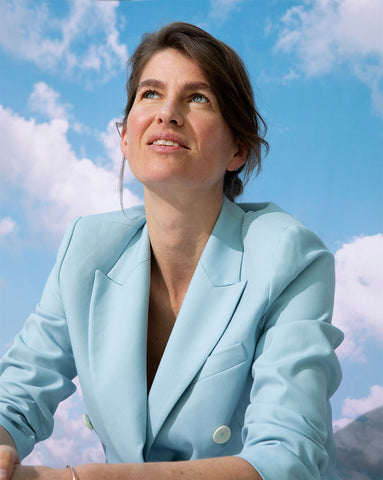
The seed for Yoni was planted after I received the results from my cervical cancer check up on turning 30yrs old. I found out I was developing cervical cancer. Luckily still in developmental stages but this meant me going in and out of hospitals for about half a year and in the end having an operation to have part of my cervix removed. This is what made me super interested in vaginal health.
When I found out you couldn’t know what your tampons and pads are made from – its just not mentioned on the packaging I felt this should be changed. Especially since a lot of products include perfume or plastic overlays that can irritate that part of your body. I obviously wanted to avoid any further irritation but not being able to find transparent and organic tampons and pads at my local drugstore or supermarket was a huge issue. Together with my friend, Wendelien Hebly, we decided to change this: All women should be able to know what their most intimate products are made from and an organic option should be available on all shelves next to the more synthetic options.
Where does the name of the brand come from?
Yoni actually means “origin of life” or “vagina” in Sanskrit. It is also a first name for both men and women – in the Netherlands there are couple hundred of people with this first name and I’ve met a couple of them J. We choose the name together with the url “.care” because this is exactly what we do.
What is it about Yoni that makes it unique from other period care products?

At Yoni we aim to be transparent about the composition of our products and we strive to ensure our products are as sustainable as possible. Next to our single use products we also offer reusable products including a menstrual cup and our organic cotton period proof underwear. We also have a communication style that is “taboo breaking” if compared to the blue liquid and white legging advertisements we all know from the larger brands that dominate the worldwide fem care market. We aim to normalize menstruation and everything vulva.
What do you mean when you say your products are ‘chemical free’ and why is this important to you?
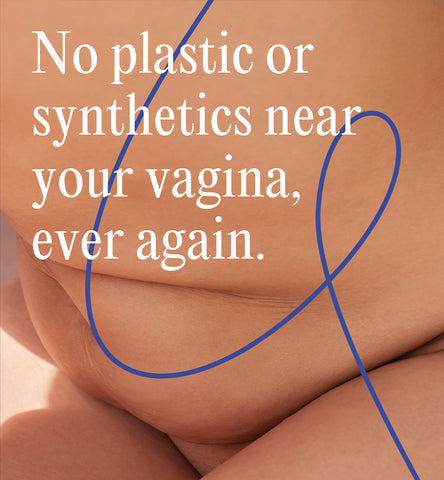
As I already mentioned we started Yoni because we believe there was – and still is – need for way more transparency within the fem care market. Every consumer should be able to know what their products are made from.
We chose a product made from organic cotton, as cotton is soft, absorbent and breathable. We also use biodegradable plastics as the backing of our pads, liners and as the wrapper of these products as well as for our tampons. This is not only better for the environment but also makes our products more breathable in terms of our pads and liners. We don’t add any perfumes or other irritants as these are really unnecessary and unsupportive to vulva and vaginal health.
At the time of product conception there were no organic cotton brands on mainstream shelves. Yoni was able to change this and as the years have gone by we see more and more smaller, but also the larger brands, following suit and offering more natural options.
What would you say is the biggest misconception about menstruation?
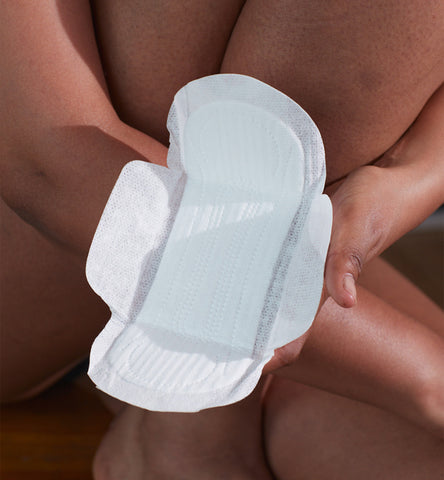
That it’s something that needs to be hidden or should be kept secretive…
Menstruation is part of many people’s life and can be a gauge for your health in general. It is therefore important that it’s normalized and conversations are had so that people become more knowledgeable about their own bodies. This also helps to become more pro-active when it comes to your health. A lot of people experience pain around their menstruation for years without it being identified that they might be suffering from e.g. endometriosis or other serious health issues.
More conversation and normalization also helps to ditch the shame around menstruation, which can effect young girls’ and women's self confidence in ways that are unmeasurable but definitely far reaching.
How do you hope to encourage women and female-sex bodies to be more open in conversation when it comes to the topic of menstruation?
With beautiful packaging design and visual way of communicating online (check out our Instagram @yoni.care) we hope to help make menstruation products to be seen as care products rather than shameful “hygiene” products. We also always aim to be direct in our communication using words like “vagina”, “menstruation”, etc. instead of beating around the bush.
I (Mariah, one of the founders of Yoni) also wrote a books “V from Vulva to Vagina” – unfortunately only in Dutch to date - to open up further conversation.
Can you tell us about your #payforaperiod campaign and Yoni’s aim to raise further awareness around period poverty?
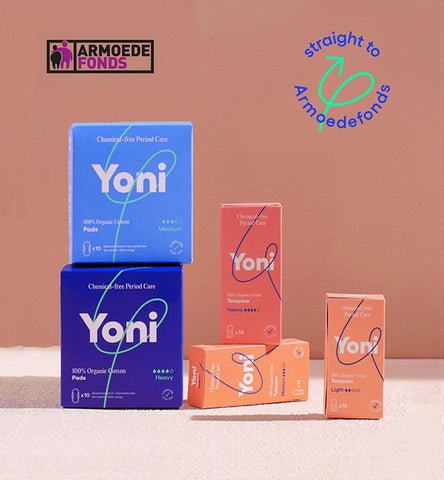
Everyone with a period can understand how debilitating it is not to have the right period products at your disposal when you need them. Often there already is a lot of shame involved in being poor. Put on top of that the taboo around periods, we see that this topic has lagged behind. It is great to see legislation coming into being supporting access to period products for everyone.
We also see that because of the taboo surrounding periods it is important to check how these products are on offer and if the people that need them really can actually get them (e.g. if you need to ask for them you might not). Here in the Netherlands we work together with the Poverty funds (Armoedefonds) with products and by promoting this story on our website where everyone can donate products directly to this organization. They then have over 1400 points where products are distributed from e.g. schools and food banks. This number is swiftly growing especially in these challenging times. We are happy to help and hope to help more in the future. This year we will be setting up a Yoni Foundation dedicated to supporting vaginal care ranging from issues like period poverty to more research or better education.

